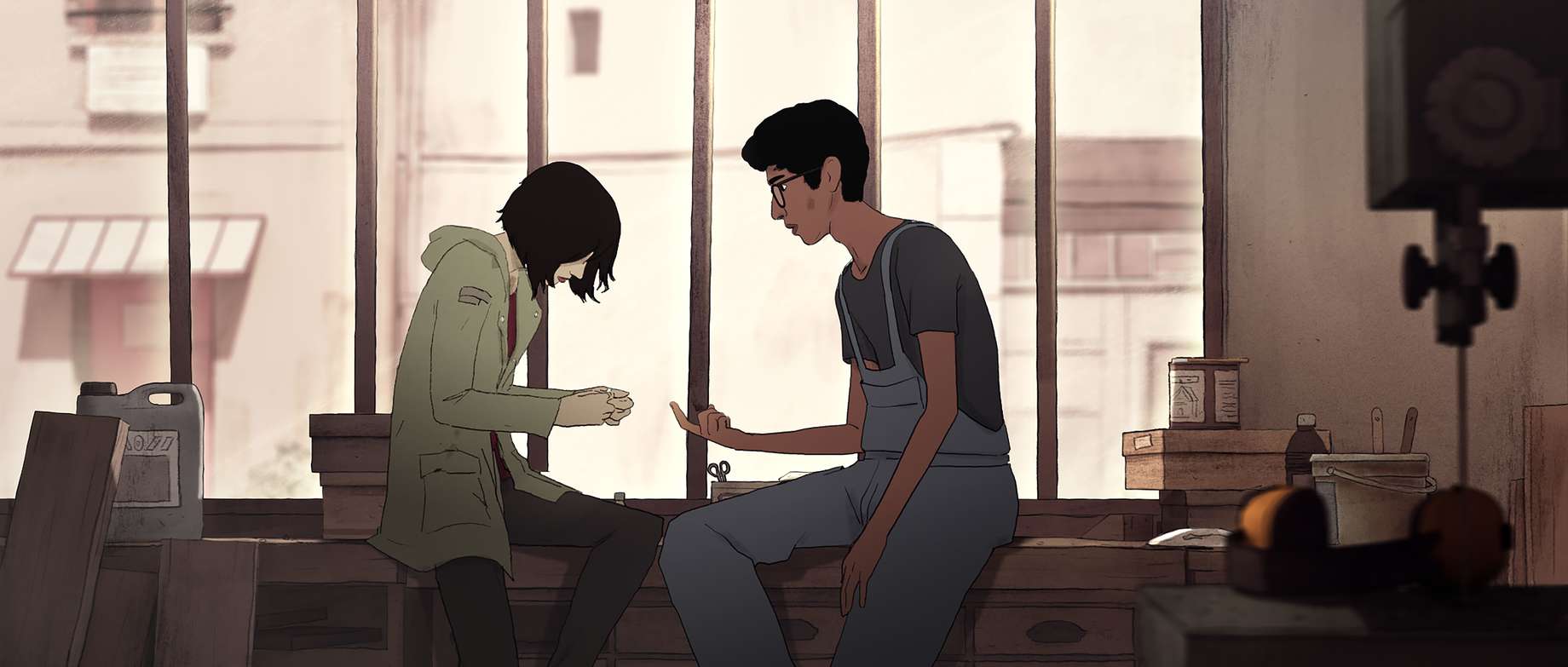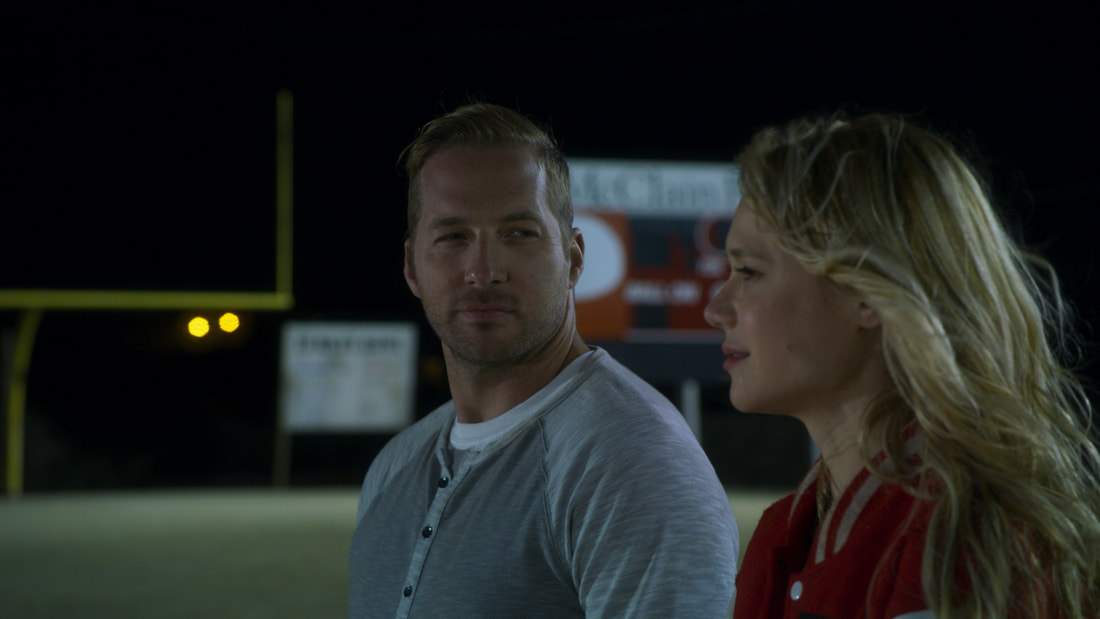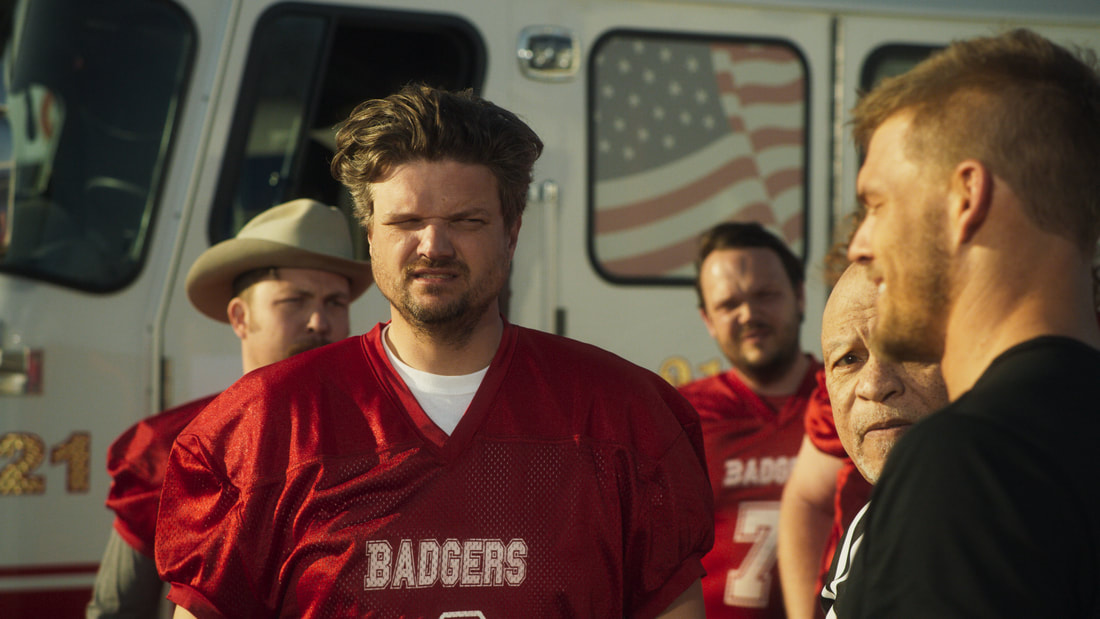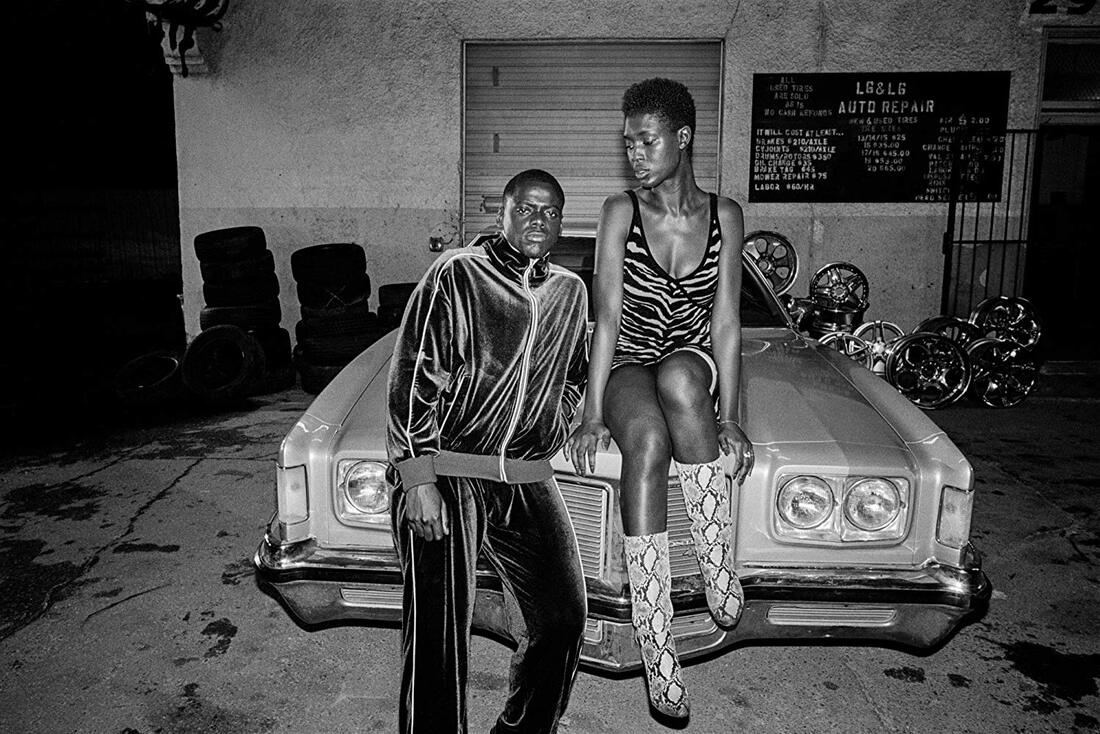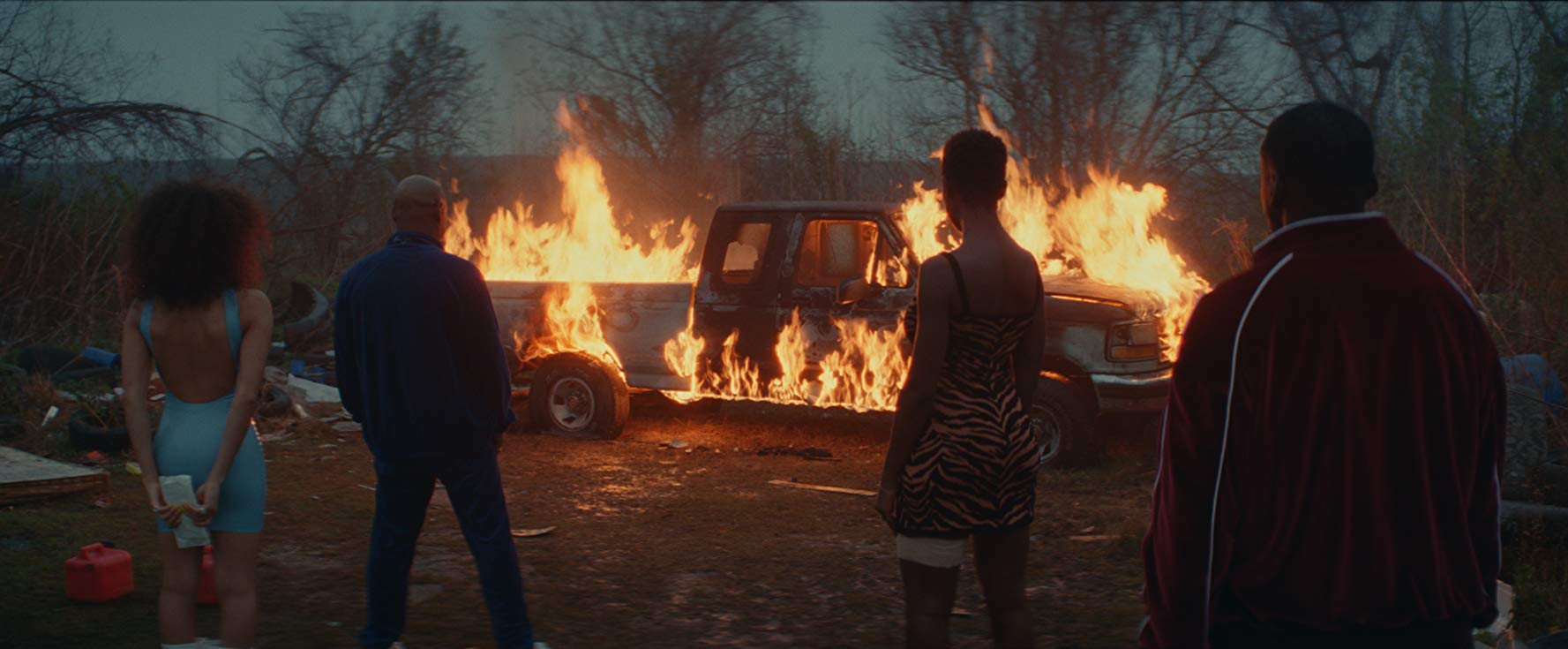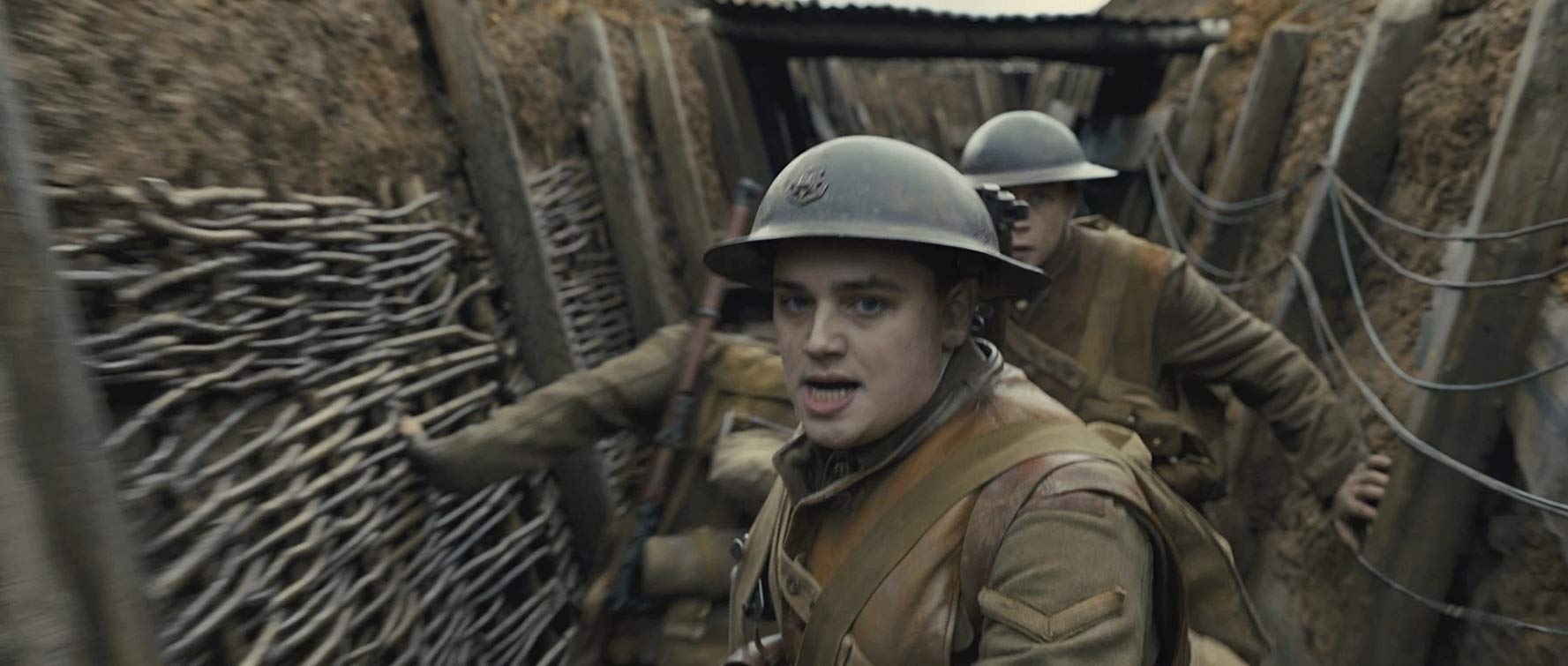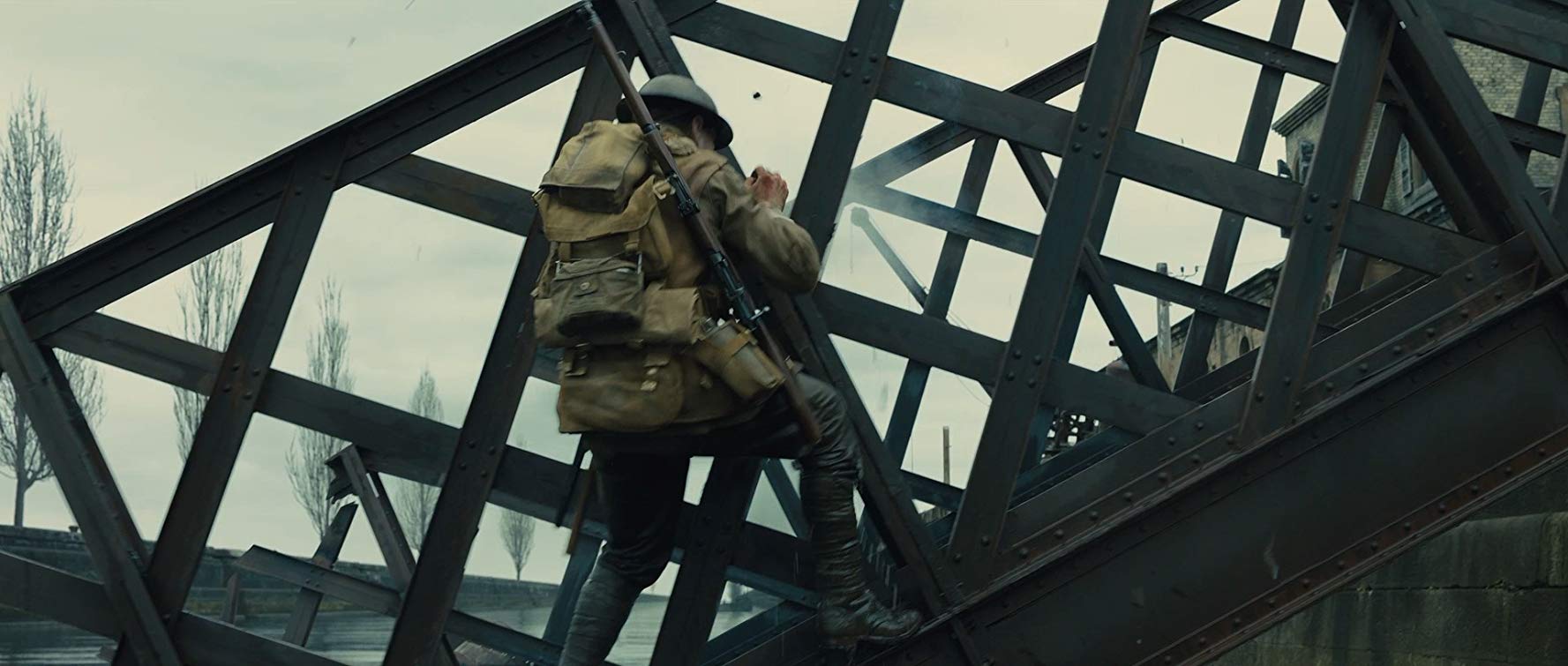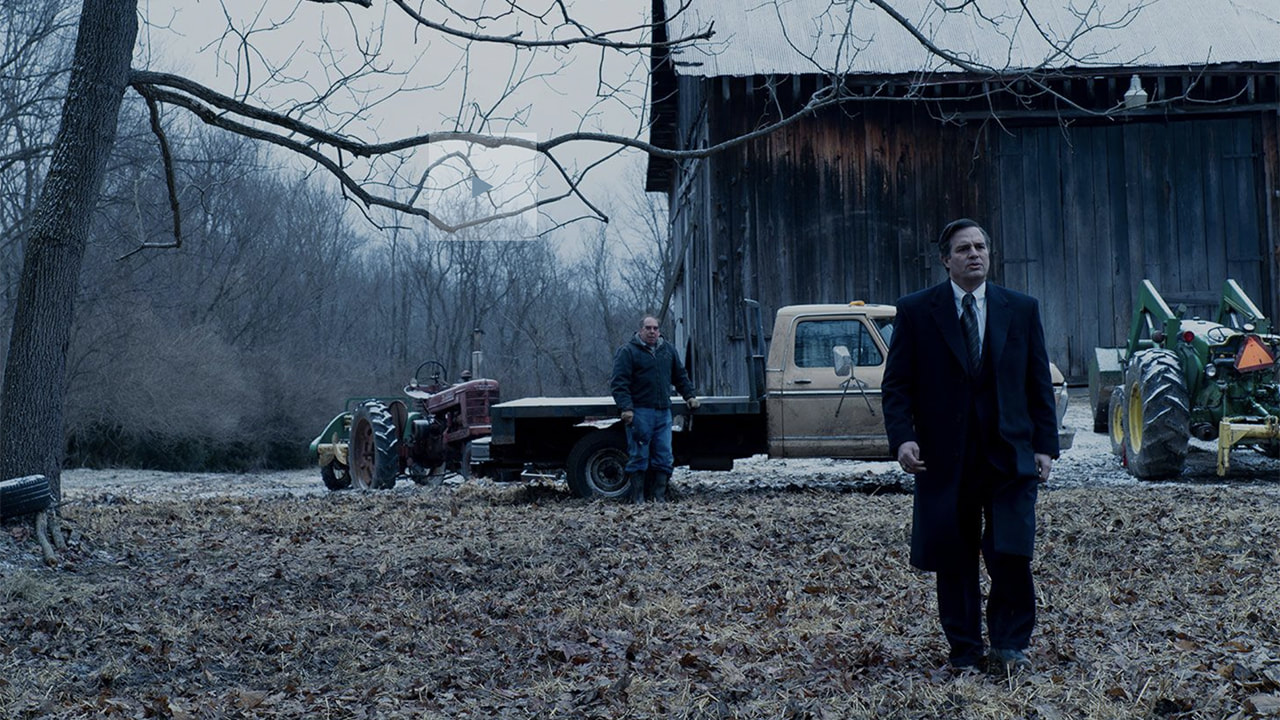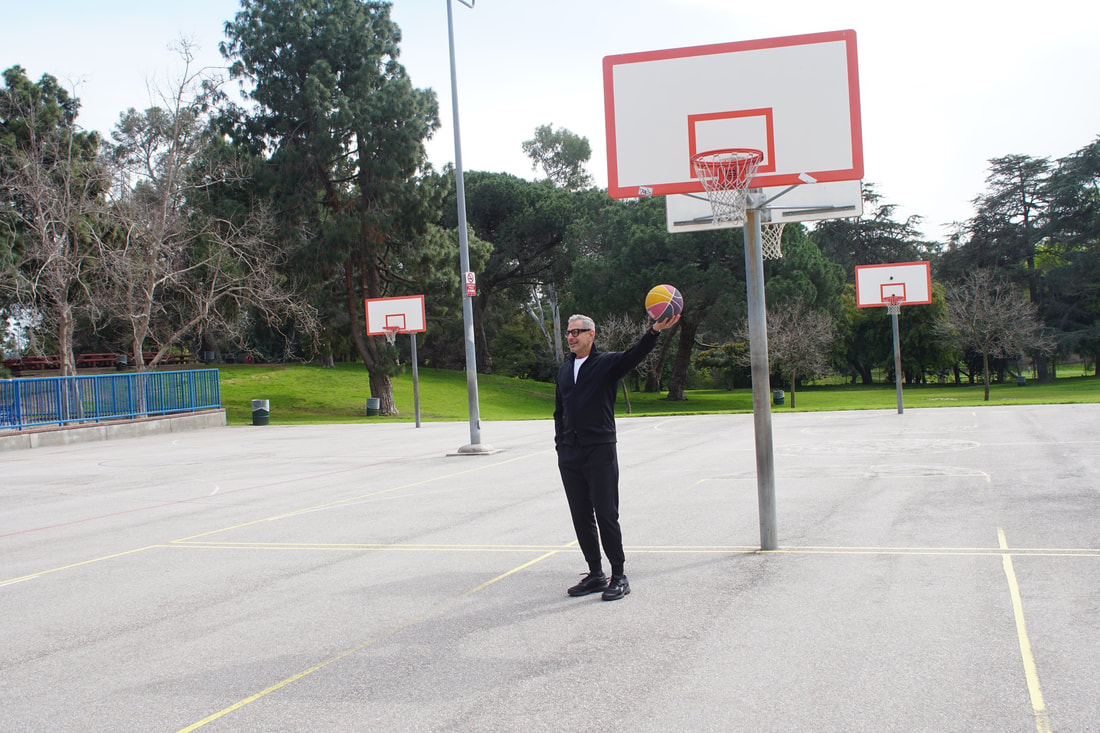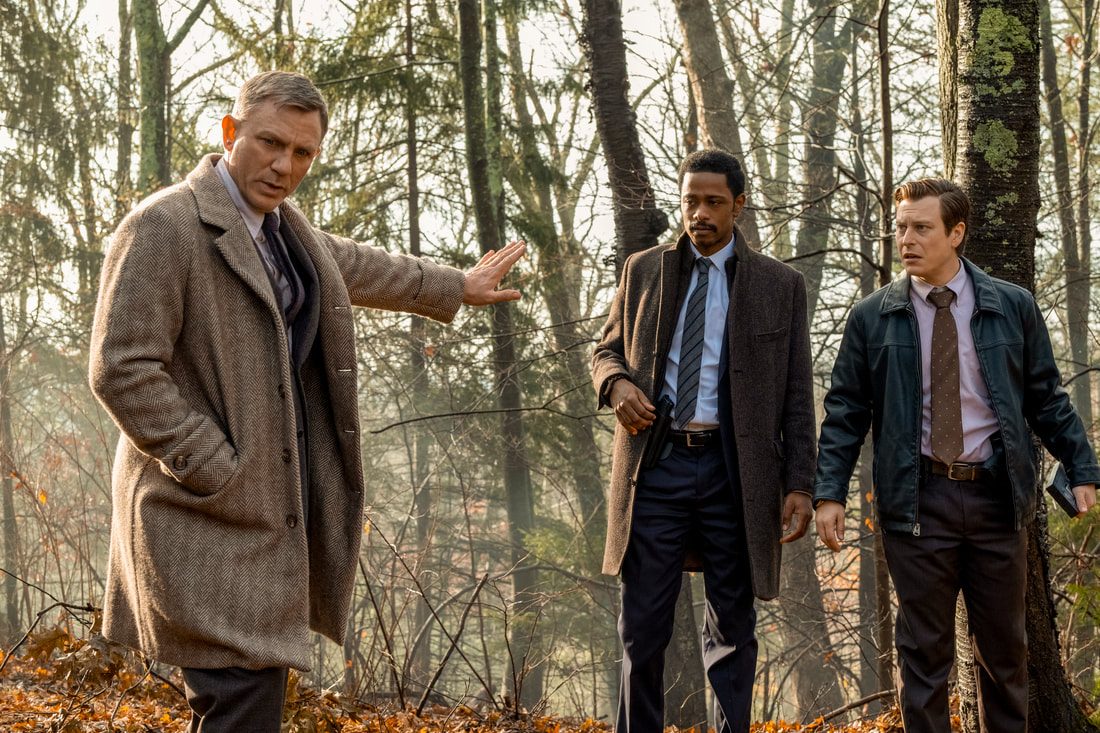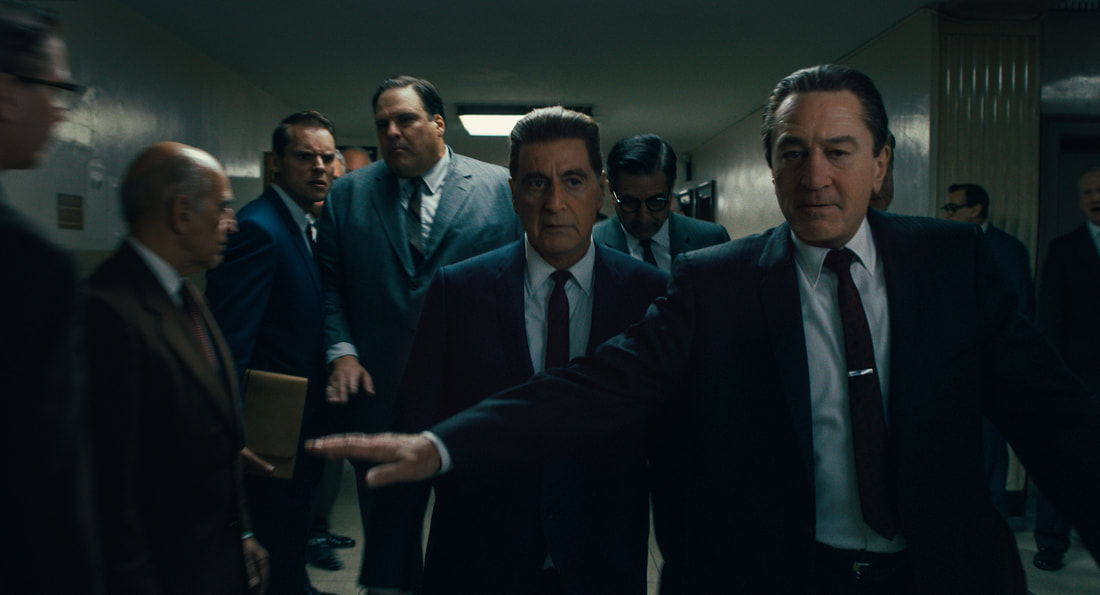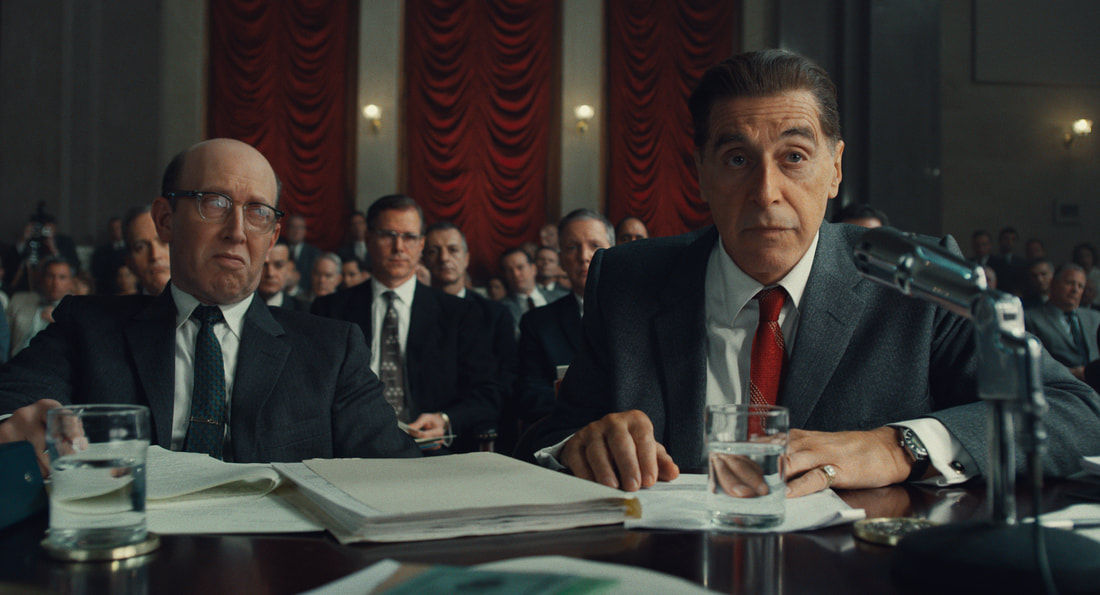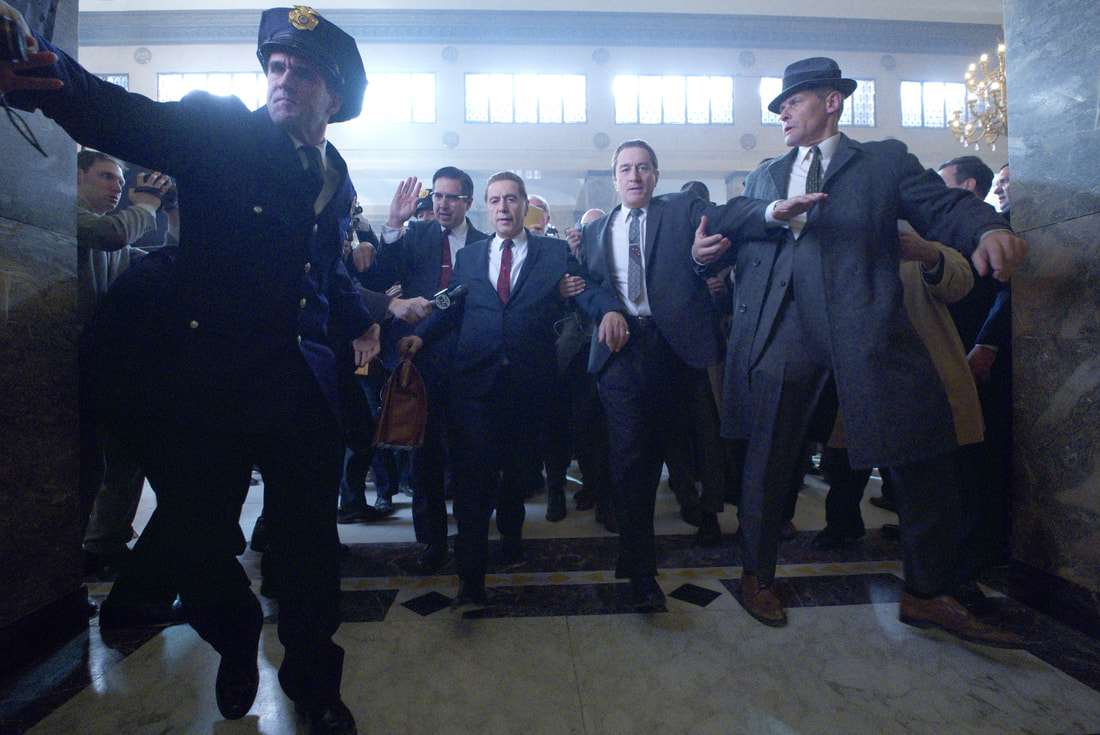|
Review by Camden Ferrell Premiering as a part of the International Critics’ Week section at the 2019 Cannes Film Festival, I Lost My Body is a French animated film that won the Nespresso Grand Prize. Directed by Jérémy Clapin, this film has enough whimsy to propel its wandering narrative even if it falls flat at times. This film follows Naoufel, a pizza delivery man who looks for love and deeper connection in his life. In another storyline, we follow a severed hand as it travels across town to find its owner. These two storylines are very original and are ripe for quirky exploration and storytelling. The writing of this movie may be its weakest asset. It is contemplative at times, but it isn’t as deep as it aims to be. It also likes to revel in the mundane interactions of its characters, and it’s rather charming. However, it wears off a little throughout. Despite this, it’s still an adequate foundation to explore our characters and the movie’s themes. One of the film’s strong points is its dazzling animation. It’s 2-D animation is very immersive and visually pleasing. It manages to look so primitive while also being mysteriously intricate. It gives the film its signature style and uses it to craft its unique and mysterious tale. While it’s a visual achievement more than anything, the film still succeeds with its themes. It tells coinciding stories of longing in concise and palatable ways. These emotions and ideas are nothing new, but it works surprisingly well in the context of the film. Despite its odd premise, this is a resonant and familiar thematic experience.
The film also excels in its attention to detail. While cinema is a fundamentally visual and auditory experience, this film makes a noble attempt at making its story tangible as well. It focuses a lot on the sensation of touch, and it ties that in with its themes very well. The film runs at a little over 80 minutes, and it mostly does a great job of utilizing every minute. However, there are moments in the film that run on a little too long. This can sometimes disrupt the pacing of the story, but this is a forgivable problem. I Lost My Body is an enjoyable and enigmatic viewing experience. It boasts great animation and rich themes, and it’s a short and contemplative film that is easy to consume. Its quirks may turn off a select few, but it’s a generally unobjectionable experience. I Lost My Body is now streaming on Netflix. Rating: 3.5/5
0 Comments
Review by Sean Boelman The Turkey Bowl, co-written and directed by Greg Coolidge (Employee of the Month), is a new sports comedy arriving just in time for the Thanksgiving holiday. Although it is admittedly rather generic, the script has enough humor and charm and the cast is talented enough that the film is entirely watchable, and may even elicit a few laughs. The movie follows a big city businessman who is lured back to his hometown by his high school buddies at Thanksgiving to finish an incomplete football game against their rivals. Ultimately, the film follows pretty much the same path as any other movie that involves a once talented athlete attempting to relive their glory days, but this arc is such a relatable one that it tends to work consistently. Much of the movie’s humor is of the slapstick variety, and there are a few visual gags in the film that are very funny. The movie is at its best when it places the protagonist in an awkward situation and milks a laugh out of the audience due to secondhand embarrassment. Some of the film’s attempts at legitimate wit end up falling flat, but few viewers watching this movie will be looking for anything more than lowbrow comedy. Perhaps the biggest issue with this film is that it is simply too long. Clocking in at right around two hours, it frequently feels like the arc could have been better conveyed in a brisk ninety minutes, particularly given the fact that the humor begins to become somewhat redundant towards the end. That said, it is the first thirty minutes that feel the most useless, as they drag out the introduction for far longer than is necessary. Additionally, the character development in the movie is somewhat lackluster. Although the protagonist has a compelling arc, all of the supporting characters are extremely archetypal and only serve to build the protagonist. The most frustrating part of the film involves the protagonist’s fiancée, as this subplot ends up feeling like an underdeveloped afterthought.
The more interesting idea explored in the movie is that of personal identity. The main part of the protagonist’s arc involves him trying to balance his background from his rural home town with the new lifestyle he has adopted. All of the different subplots, some compelling and others too flat to add much depth, simply serve to accent this main struggle. On a technical level, the film is mostly solid. Even though there is really only one major sports scene, that sequence is shot in a way that is surprisingly exciting and suspenseful. There aren’t really any stakes in this scene, but the cinematography, editing, and soundtrack are done in a way that creates a sense of tension during the climax. The Turkey Bowl isn’t a particularly deep or complex movie, but as a holiday comedy, it works surprisingly well. For a lighthearted (but not-so-wholesome) flick to watch on Turkey Day, this is a solid choice. The Turkey Bowl is now available on VOD. Rating: 3.5/5 Review by Sean Boelman Queen & Slim, written by Lena Waithe (Master of None) and directed by first-timer Melina Matsoukas, is a new crime drama dealing with the timely theme of police brutality. Although it is a bit rough around the edges, Matsoukas’s voice is evident and Waithe’s script does a lot of leg work to make this an extremely compelling parable. The film follows a young African-American couple as they go on the run after a date gone wrong. Although some, even some of the movie’s characters, would describe this as a “black Bonnie and Clyde”, that would be a huge disservice to the nuances and complexities of this script. Whereas the typical Bonnie and Clyde tale glorifies the life of crime led by the protagonists, Queen & Slim is instead a scathing critique of the justice system and the way in which the public reacts to the media. The most interesting idea explored by this film is the way in which the public reacts to the actions of the main characters. Some characters believe them to be heroes, and others see them as vicious killers. By painting the characters and their actions in a morally ambiguous light, Waithe’s script brings a lot of humanity and realism to these characters, thereby allowing the movie to be an interesting conversation starter. The script does a very good job of making the characters sympathetic, regardless of which side of the debate on which the viewer falls. However, perhaps most intriguing about the film is that it throws the audience almost directly into the action. Although a single scene gives enough context as to their personalities to allow the characterization to be effective, viewers aren’t given much more before the incident that is likely to polarize the audience. Daniel Kaluuya (Get Out) gives a phenomenal turn as the movie’s lead, and his performance is completely different from anything else he has done in the past. Whereas most of his past roles have required him to be a lot flashier, this character relies on his subtlety to bring out the emotion within the text, and he delivers. The true standout, though, is Jodie Turner-Smith in her first leading role. The way in which she commands the screen never ceases to impress, as she grips the viewer’s attention from beginning to end.
Many of the film’s issues come down to pacing, and that seems to be more a result of this being Matsoukas’s first feature-length directorial effort than anything else. At just over two hour and ten minutes, the movie could have spared to be just a bit shorter, but even so, the film doesn’t quite have the visual rhythm it needs. The cinematography and score are both wonderful, but the editing is somewhat lacking. One of the most frustrating things about the movie is that the editing frequently works against the script and its natural emotion. There is one particularly disappointing sequence that cross-cuts between the two emotional climaxes of the film. Individually, these two moments could have been extremely hard-hitting and resonant, but because they are presented in this way, they end up feeling rushed and don’t have quite the impact that they otherwise would. Lena Waithe’s script for Queen & Slim is one of the year’s best, and director Melina Matsoukas obviously has a lot of talent and potential; however, in the translation from page to screen, something seems to have been lost, keeping the movie from being as brilliant as it should be. It’s still very good, but Matsoukas’s masterpiece is yet to come. Queen & Slim is now playing in theaters. Rating: 4/5 Review by Sean Boelman The newest film from acclaimed director Sam Mendes (Skyfall, American Beauty), 1917 is undoubtedly the most successful attempt at technical ambition this year, and perhaps even this decade. Taking the simulated one-take structure popularized by Birdman and applying it to a genre that is far more difficult to pull off, Mendes has crafted a marvelous movie that is sure to dominate end-of-year conversations. Although this film was very much a team effort, a large amount of the credit should go to cinematographer Roger Deakins who has all but locked himself in to win his second trophy from the Academy. The level of planning that was required of these filmmakers to achieve the simulated one-take is thoroughly impressive, but even beyond that, the movie is just gorgeous. Deakins uses the camera in a way that is both thrilling and humanizing, emphasizing the emotion in the story. The film follows two British soldiers during WWII as they are tasked with delivering an urgent message to the front lines, sending them through enemy-occupied territory. While there isn’t much more to the story than this, it is still extremely compelling thanks to the unorthodox approach that Mendes (and co-writer Krysty Wilson-Cairns) took to this story. Rather than a sprawling war epic, this is a small-scale story focusing on the journey of very few characters. Because the movie plays out in nearly real time, the pacing is quite unique and effective. From the moment the film starts, audiences will be drawn into the movie and its world. Even when it seems like the story is slowing down, these lulls are almost even more anxiety-inducing because the stakes are established early on and viewers know that the characters are never truly “safe”. Part of what makes this film so effective is that the character development is so lean and precise. With all of the action, one would expect that there wouldn’t be much time to explore the characters and give them personalities, but the sympathy that viewers will have for the characters is built over the course of the movie subtly and allows the film to be quite hard-hitting.
Other than one or two lines which feel a bit too obvious, the movie resonates surprisingly on an emotional level. In certain scenes when one would least expect it, the film hits an emotional chord that is absolutely heart-breaking. This movie features two of the most gut-wrenching scenes of the year, yet the film never feels like it is simply trying to pull at the heartstrings. George MacKay and Dean-Charles Chapman are both absolutely wonderful in their leading roles. Their chemistry together is phenomenal and they are able to completely sell all of the emotion in the more impactful moments. Chapman, in particular, shows the great range he has. However, likely the most interesting thing about this movie’s cast is that it features well-known actors like Colin Firth and Benedict Cumberbatch in small but thoroughly effective parts. Any other director likely would have made them the star of the show, but Mendes allows the up-and-coming talent to shine, and to great effect. 1917 is a gorgeous and captivating war film, and likely the best cinematic experience of the year. This is a movie that demands to be seen on the big screen, with the best projection possible and the clearest sound available. Anything else would be doing this work of art a disservice. 1917 opens in theaters on Christmas Day and expands nationwide on January 10. Rating: 5/5 Review by Camden Ferrell Dark Waters is a legal drama directed by Oscar-nominee Todd Haynes (Carol). Even if it might be a bit slow to start, this movie quickly becomes an engrossing and essential story of corruption and exploitation that is still relevant today. This movie is based on the true story of Robert Bilott, a corporate defense attorney that sues a powerful chemical company for their long history of pollution and endangerment. We watch as Bilott puts his career, health, safety, and family on the line to fight for the truth and to get justice for those who have suffered. This is a remarkable story about a strong and determined attorney that gives this film strong narrative footing. Written by Matthew Michael Carnahan and Mario Correa, this is a rather intelligently written film. It tackles legal themes and ideas in a way that is smart yet very accessible to the public. It doesn’t indulge in too much jargon; it’s concise and very efficient with what it has to say. It features some great dialogue that allows its actors to really explore their characters and interact with their co-stars. This film stars Mark Ruffalo (Spotlight) as Robert Bilott. Ruffalo does a fantastic job of capturing this complex role. While he is a mild-mannered attorney, Ruffalo does a great job of subtly showing the turmoil and conflict within his character. Even though most of his performance is subdued, he has some great moments full of emotional bursts and frustration. Both Anne Hathaway and Tim Robbins support Ruffalo as lead, and they both deliver great performances. Hathaway plays Bilott’s wife with tangible passion and concern, and Robbins has some great moments as chairman of the firm. Haynes’s direction is very strong throughout. It’s a tight and controlled legal drama that effectively tells its story without much distraction. His attention to detail and character development help give this movie an emotional core to support its factually based narrative.
This movie is a truly eye-opening experience. It unveils the corruption and despicable negligence of DuPont in a way that is repulsive to watch. The movie intends to scare you with each and every revelation, and it succeeds on that front. It also portrays the human and emotional tolls these events take on the townspeople but especially Bilott and his family. These moments are resonant and powerful with what it says. The movie boasts a timely message that is still relevant today, and it leaves you with a sinking feeling of dread and mistrust. Despite all that worked for this movie, it does take a while to find its stride. The first act of the film drags on a little too much. However, once Bilott descends deeper into this legal rabbit hole, the movie is smooth sailing from then on. For the most part, the film takes an emotionally bleak legal drama and makes it work in its favor. Dark Waters is a great drama that is as gripping as it is intelligent. It’s a revelatory experience that is heightened by some great performances from Ruffalo, Hathaway, and Robbins. While it may be slow to some, this is still a fantastic and informative true story. Dark Waters is in theaters now. Rating: 4/5 THE WORLD ACCORDING TO JEFF GOLDBLUM -- A Fascinating Infotainment Series with a Charismatic Host11/26/2019 Editor's Note: This recurring column was cancelled after episode 3 due to controversy involving the show's host. S1E1: "Sneakers"Review by Sean Boelman The World According to Jeff Goldblum, produced by Disney+ and National Geographic, is a new documentary series exploring various trends taking the world by storm. A must-see for any fans of the show’s host, and an entertaining and informative documentary series in general, hopefully this show is indicative of the quality of the rest of the documentary offerings from Disney+. In each episode of this series, Goldblum will take a deep dive into a particular trend beloved by people around the world and explore some of the science, history, and stories associated with them. Although there are plenty of other documentary shows that do similar things, mainly on the Discovery Channel, The World According to Jeff Goldblum sets a new standard for infotainment by presenting the information in a way that is thoroughly enjoyable. Of course, a big part of the success of this series is the charm of its host. A talented character actor known for his eccentric personality, it seems like it was Goldblum’s destiny to star in a show like this. Because he seems legitimately fascinated by the information being communicated by the experts he is interviewing, the interviews play out in a way that is completely absorbing. The only weakness of the series seems to be its execution, which is a bit too hectic for its own good. Even though everything about the show looks good, it seems like the creators couldn’t decide what the best means of communicating the information to the audience in a palatable way would be, so they tried a bit of everything and hoped that something would stick. Hopefully this issue will smooth itself out over the course of the next few episodes.
This first episode explores the phenomenon of sneakers by investigating the history of the shoe style and showcasing some of the leaders in the footwear industry. Though one normally wouldn’t expect a shoe to the basis for a riveting hour and a half of television, the episode shines a light on a side of the industry of which few viewers are unlikely to be aware. Some of the interviews featured in the episode provide some pretty mind-blowing insight into something many people wear on their feet every day. With upcoming episodes centering around such things as ice cream and tattoos, The World According to Jeff Goldblum is sure to become a fan-favorite documentary show on Disney+. Despite a few kinks that need to be worked out, this fascinating docuseries is going to be one of the streamer’s best offerings. The World According to Jeff Goldblum is now streaming on Disney+. New episodes stream every Friday. Rating: 4.5/5 Review by Dan Skip Allen 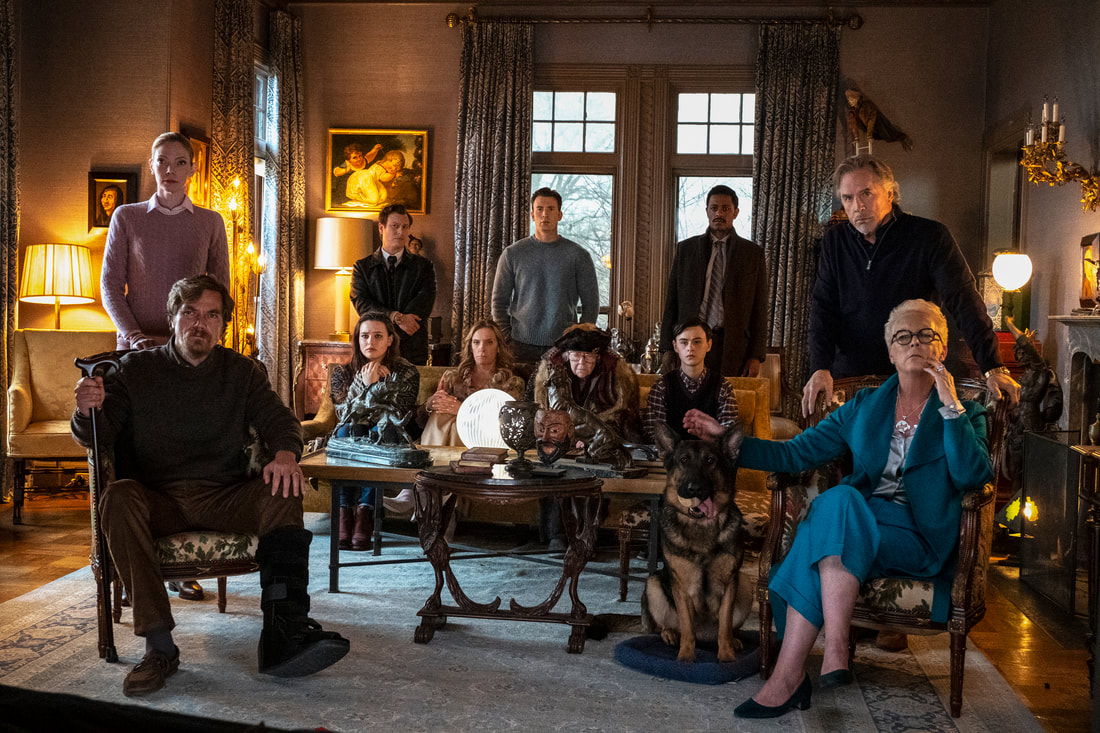 From left to right: Donna (Riki Lindholm), Walt (Michael Shannon), Meg (Katherine Langford), Trooper Wagner (Noah Segan), Joni (Toni Collette), Ransom (Chris Evans), Great Nana (K Callan), Jacob (Jaeden Lieberher), Lt. Elliott (LaKeith Stanfield), Richard (Don Johnson), and Linda (Jamie Lee Curtis) in KNIVES OUT. Murder mystery films aren't anything new to cinemas. Rian Johnson channeled the genre's classics when making Knives Out. He added the mystery and suspense of Ten Little Indians and Murder on the Orient Express and the comedy of Clue to create his own version of a murder mystery, and a brilliant one at that. When a patriarch of a wealthy family is murdered everybody is a suspect. Everybody has greed in their hearts and motive to boot. Rian Johnson wrote the script for this film as well as directed. He gives all the characters a lot of juicy dialogue. The script is full of witty banter and clever one liners. The two that say the most and eat the scenery are Ransom Drysdale (Chris Evans) and Benoit Blanc (Daniel Craig). They both play against type which makes their performances that much more enjoyable. Ransom is a fowl-mouthed snob everybody in the family hates. Blanc has a knack for saying the funniest things at the wrong time. The cast Johnson assembled is perfection personified. Jamie Lee Curtis, Michael Shannon, Don Johnson, Ana de Armas, Lakieth Stanfield, and Toni Collette are just a handful of the phenomenal talent in this film. They all get their moment to shine. Besides Evans and Craig, Ana de Armas is the standout in this film as the caregiver to the head of this family. In her previous films, she has portrayed the sexpot, but she is nothing like that in Knives Out. She might even be good enough for an Academy Award nomination for her role as Marta. Rian Johnson is best known for writing and directing Brick, Looper and Star Wars: The Last Jedi. After this year people are going forget he wrote and directed those films because Knives Out is his best work to date. There is a reason why all these amazingly talented people jumped onto the project. Once they had a chance to read the script, they knew how brilliant it was and wanted to be a part of something great. Johnson injected this film with a lot of things that make great films. This just shows you don't need a bunch of visual effects and explosions to make a great film.
Knives Out has everything a viewer wants in a great film. Great acting, great script, and great direction all add up to a great film. Johnson added enough twists and turns to keep the audience guessing until the very end. It wouldn't be surprising if it got multiple Academy Award nominations for writing, directing, and multiple acting noms for Best Supporting Actor for Evans and Craig and supporting actress for de Armas. This is one of my favorite films of the year! Knives Out opens in theaters on November 27. Rating: 4.5/5 Review by Sean Boelman The newest film from acclaimed writer-director Trey Edward Shults (It Comes at Night, Krisha), Waves is a searing portrait of family amidst that plague today’s youth. One of the most brutally earnest movies of the year, if not the entire decade, this film certainly isn’t for everyone, but it is a truly visceral experience that will stick with viewers long after the credits roll. The film follows a suburban family living in south Florida as they deal with the issues they are presented by society and try to stay together after being stricken by tragedy. Shults presents this story in a way that starts out feeling like a slice-of-life drama and morphs into something very different and much more challenging. The result is a movie that feels far more realistic than the traditional coming-of-age film. One of the most interesting things about this movie is that there is a drastic shift in tone and pace around the halfway mark. Although it is difficult to describe this change without spoiling its merit, this makes the film resonate even more. Ultimately, the first half of the movie is stronger than the second, but not by much, and they complement each other extremely well. This film deals with some tough subject matter, but the themes which it addresses are extremely timely. Shults approaches his characters with a unique humanity, allowing the story to feel even more universal. In other hands, the characters, particularly the protagonist, would have been handled with less nuance and treated in a more didactic way. Instead, Shults allows the characters to speak for themselves. Kelvin Harrison Jr. is having one hell of a year, and between this and Luce, he has proven himself to be one of the most talented actors working today. He brings so much vulnerability to his leading role, particularly as the character’s life begins to crumble, that viewers won’t be able to help but sympathize with the character. The supporting cast, including Sterling K. Brown and Alexa Demie, is also wonderful, each performer getting their chance to shine in the spotlight.
In many ways, this movie is absolutely soul-crushing, but that is exactly what Shults seems to be trying to do. Audiences won’t be leaving the theater feeling warm and fuzzy about the way that society treated this family, but there is still plenty of hope to be found in this narrative about the value of family and love. Even though it is a difficult watch, it is a rewarding and cathartic one all the same. On a technical level, this is perhaps Shults’s most ambitious film yet, with visuals that are absolutely stunning. The cinematography is phenomenal, especially in the first half, which features some gorgeous 360º shots. Additionally, the music, both the soundtrack and the score by Trent Renzor and Atticus Ross, is effectively a character in the movie in and of itself because it is so brilliant. Waves is the type of film that seems destined to polarize audiences, but it is also entirely unforgettable. Thanks to writer-director Trey Edward Shults’s personal approach to the story and experimentation with the narrative structure and visuals, this stands out as one of the year’s most unique cinematic experiences. Waves is now playing in theaters. Rating: 4.5/5 Review by Sean Boelman 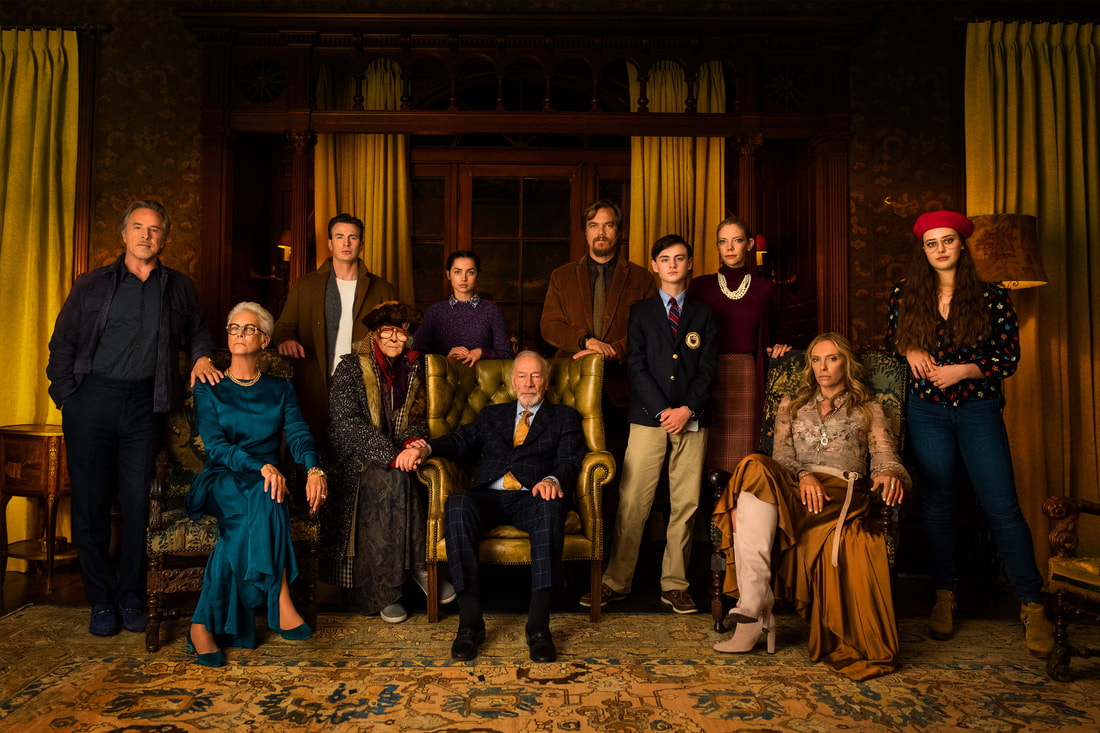 From left to right. Richard (Don Johnson), Linda (Jamie Lee Curtis), Ransom (Chris Evans) Great Nana (K Callan), Marta (Ana de Armas), Harlan Thrombey (Christopher Plummer) Walt (Michael Shannon), Jacob (Jaeden Lieberher), Donna (Riki Lindholm), Joni (Toni Collette) and Meg (Katherine Langford) in KNIVES OUT. Photo credit: Claire Folger. Knives Out, the newest film from writer-director Rian Johnson (Star Wars: The Last Jedi), is an old-school whodunit with a large and talented ensemble cast. Although the middle section of the movie does drag on for a bit too long, this manages to be a thoroughly entertaining flick. The film follows a dysfunctional family as their conflict comes to a head when the patriarch of the family dies mysteriously. Although the story is obviously very influenced by the classic mysteries of Agatha Christie, Johnson puts a unique spin on the genre that never quite hits the level of parody, but still addresses the tropes in an entertaining and tongue-in-cheek way. The result is a movie that will satiate audiences’ cravings both for laughs and for a twisty mystery. As one would expect, this film is heavily dependent on twists, and it is best enjoyed if audiences go in knowing as little as possible about the reveals. Much of the movie’s runtime is spent building towards the end, and while the point at which the film ends isn’t entirely expected, it also doesn’t offer a satisfying conclusion given the unorthodox nature of what came before. The first act and final act of the movie are undeniably the strongest, with the middle portion losing some of the steam that is established by the introduction. Ultimately, there are enough laughs in this center portion to keep viewers interested in the events of the film, but one can’t help but feel like this section of the movie is missing something. Although this portion is necessary to the story in the long-run, it does take a bit more patience in this section than a movie like this otherwise should. As is the case with any great whodunit, there is a large ensemble of wacky characters to be the suspects in the case. Although there are some characters who have more of an arc than others, even those who are archetypal serve a purpose and are quite entertaining to watch. And of course, Johnson’s version of Sherlock Holmes or Hercules Poirot, Benoit Blanc, is enormously entertaining to watch.
Daniel Craig’s performance as the over-the-top detective is frequently hilarious, and while it doesn’t have a great deal of emotional nuance, it accomplishes the goals of the film quite will without fail. The rest of the cast is also excellent, but they are used to various degrees of effectiveness. For example, Jamie Lee Curtis and Ana de Armas are both wonderful and are given plenty to do in the movie, but Jaeden Martell and Don Johnson both feel disappointingly underused. On a technical level, the film is also very good, creating an atmosphere that is successfully reminiscent of the genre’s greats. The cinematography and production design are both great, very much setting the movie in the modern day but also giving a very nostalgic feel to the product. Additionally, the score by Nathan Johnson is one of the year’s best, setting the film’s tone quite well. Knives Out doesn’t have the depth of Johnson’s earlier work, but it shows that he has command of how to make a compelling and entertaining popcorn flick. Thanks to a great cast and crew giving it their all, this is a crowd-pleaser perfect for the long weekend. Knives Out opens in theaters on November 27. Rating: 4.5/5 Review by Dan Skip Allen Childhood can bring a lot of different emotions and things that shape a young person's life. I discovered Scorsese pictures at a young age. Around the age of six, I saw my first Scorsese film: Raging Bull! From that moment on, I was enamored with this director. He told stories about people that seemed real to me, even as a little boy. Films like Mean Streets and Taxi Driver were about grounded people you could meet any day of the week, month, or year. That said, Jake LaMotta was more real as any character I've ever seen in my life. Yes, Raging Bull was about a middle-weight boxer who had legendary fights with Sugar Ray Robinson, but he was more than that to me. I could relate to him as a person outside the ring. When Jake was arguing about his wife over cooking his steak, that was my father and mother. When he would leave at night and leave Vickie home with the kids and she didn't know where he was going, that was my family. My father rarely came home, and when he did, he and my mother fought like cats and dogs. The violent scene when Jake attacked Joey was reminiscent of my father as well. Anger ran in the family — I had anger issues growing up my entire life until I channeled it into positive things like writing and listening to music. Taxi Driver really hit home for me because of the fact that Travis Bickle was a misunderstood loner. I could relate once again because I am very similar to him in a lot of ways. I live by myself and I have for quite a while. I am not fond of people that much. Of course people are a necessary evil when going places like restaurants and movie theaters, and in working environments when you have to deal with a lot of people you don't like. Travis found a mission though when he tried to save Iris from Sport. He was also very odd and obnoxious when dealing with Betsey. Scorsese would later revisit this strange odd type of caricature with The King of Comedy, in which De Niro again portrayed the awkward oddball. Both characters don't know when they've gone too far or when to take no for an answer, largely because they are both introverts and don't get the interaction with people that would help them develop people skills better. Scorsese would eventually return to gangster pictures after his first foray into them with Mean Streets. Goodfellas would once again team him with his friends De Niro, Pesci, and Frank Vincent for this film about Henry Hill, a mobster famously turned FBI informant. Scorsese painted a picture of this glamorous lifestyle and I was hooked from the beginning. The scene where Henry was escorting Karen through the Copacabana with the song "Then He Kissed Me" by The Crystals playing over them was the scene that cinched it for me. This movie was a masterpiece. Scorsese would return once again to this genre with Casino and later The Departed, once again re-teaming with De Niro for the last time until The Irishman. Scorsese and De Niro (with some help from Francis Ford Coppola and Al Pacino) defined this genre. The Irishman is the latest gangster film in Scorsese’s long history in the genre, but it's a different kind of gangster film than has been brought to the screen before. The Godfather films and Scorsese's own Goodfellas, Casino, and The Departed feature a lot more blood and violence than The Irishman. Even though a couple of these films are based in reality, none of them have been as realistic a take on this genre as The Irishman. Scorsese could only make this film at this point in his storied career as a filmmaker. He crafted an absolute masterpiece! The Irishman picks up with Frank Sheeran (Robert De Niro) at a nursing home as he is telling his life story to a priest. His story spans 7 decades, from WWII to the 2010's. During that time, he goes from being a truck driver for the teamsters to a hit man for the mob. Frank meets a lot of notable faces during that time as well. Some of them are Russell Bufalino (Joe Pesci), Angelo Bruno (Harvey Kietel) Felix "Skinny Razor" Ditullio (Bobby Cannavale), Anthony Provenzano (Stephan Graham), Bill Buffalino (Ray Romano), and most notably Jimmy Hoffa (Al Pacino). Most of the heavy lifting in The Irishman is done by De Niro, Pesci, and Pacino, who all give Oscar-worthy performances. De Niro and Pesci give more subdued performances than they have in the past working with Scorsese. Pacino, on the other hand, gives the kind of performance people have come to expect from him. He makes this character of Jimmy Hoffa loud and noticeable for all to see. Without all of these terrific performances from these screen legends, this film wouldn't work. They are the best performances these three have given in decades. It reminds you how great they really are and why they are among some of the greatest living actors. I've never seen a film that touches on themes like this in this film in this way before. Steve Zallian adapts the book I Heard You Paint Houses by Charles Brandt. This source material says everything. In turn, everything was on the page for Scorsese to craft a retrospective tale of real men. They deal with real issues that affected the country, their families, their friends, and thousands of other people. This film deals with aging, loyalty, and friendship to an extent that has never been done before. Scorsese has dealt with the genre of gangster films in so many different ways during his career, but The Irishman is on a whole new level. The subtle way he deals with violence is masterful. The grace in which he deals with aging is only able to be done by someone of his age and stature. The Irishman is like an amalgamation of Goodfellas and Silence. He dealt with a de-aging technology that has been previously used very sparingly in a few MCU films. It's mostly effective and becomes nearly unnoticeable after about fifteen minutes.
Additionally, despite the film’s three-and-a-half-hour length, it goes by so quickly. That takes a master filmmaker who can make you not realize how long the film is. The Irishman is a masterpiece of filmmaking in every sense of the word. It is the culmination of so many great people's careers. That includes Thelma Shoonmaker, who does a phenomenal job editing this film. This is easily the best film of the year and deserves many Academy Awards. Scorsese has etched his way into the annals of film lore with his filmography. He helped create the gangster genre with Mean Streets, Goodfellas, Casino, and The Departed and shepherded some of the greatest actors of all time with Robert De Niro, Leonardo DiCaprio, Joe Pesci, and Harvey Keitel. He made some of the greatest films of all time and experimented with new technologies. His work as a preserver of film is also commendable, as he created a group to help save old and forgotten films. Martin Scorsese is a legend and modern auteur in every way! The Irishman is now playing in theaters and hits Netflix on November 27. Rating: 5/5 |
Archives
July 2024
Authors
All
|
|
|
disappointment media
Dedicated to unique and diverse perspectives on cinema! |

